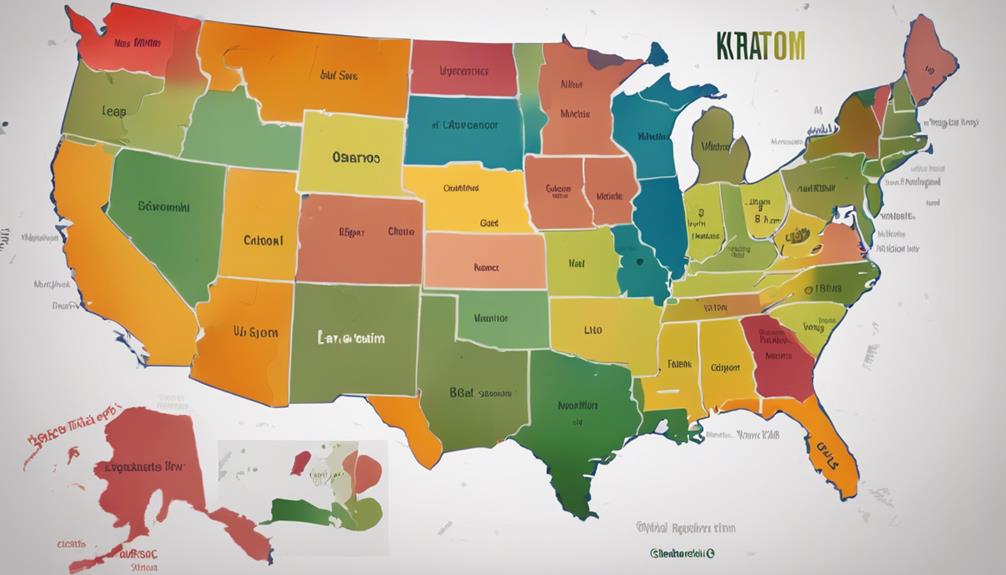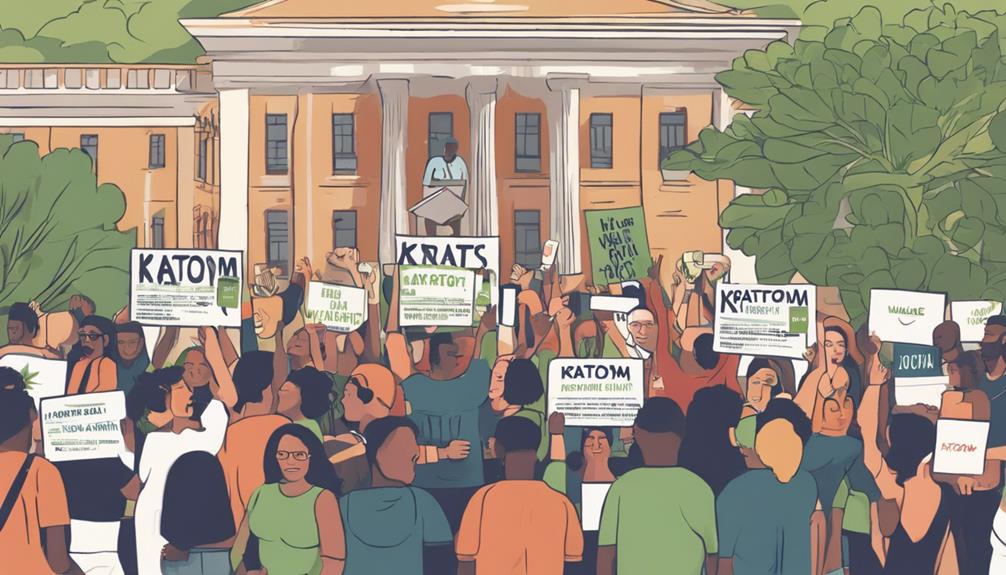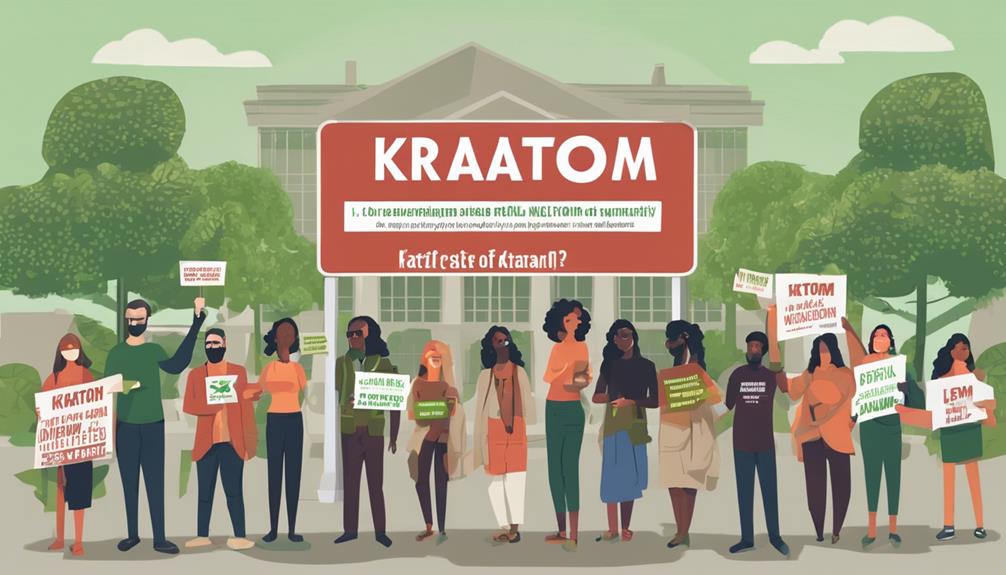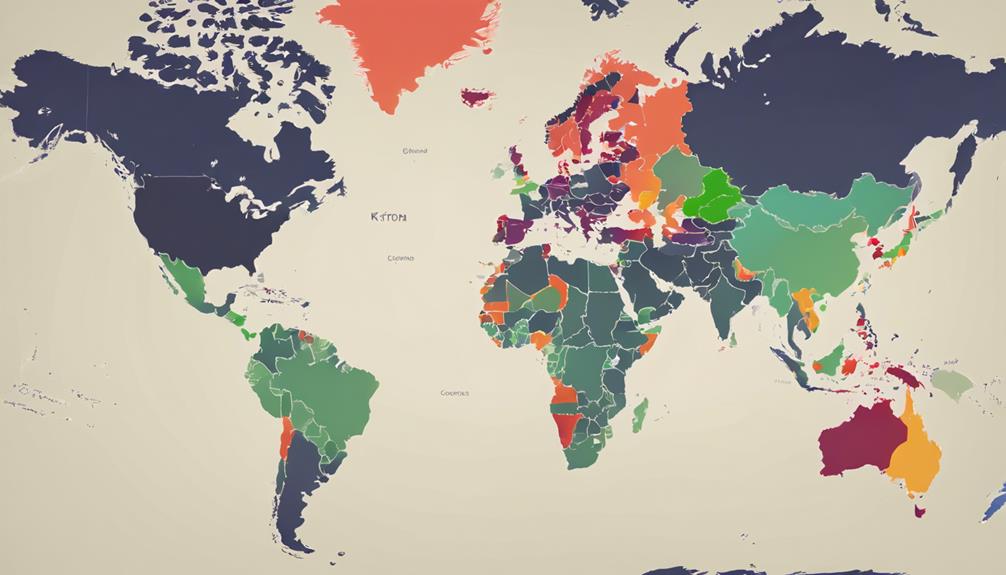Deprecated: mb_convert_encoding(): Handling HTML entities via mbstring is deprecated; use htmlspecialchars, htmlentities, or mb_encode_numericentity/mb_decode_numericentity instead in /home/users/kratomfiles/www/kratomfiles.com/wp-content/plugins/quick-adsense-reloaded/includes/template-functions.php on line 3552
When it comes to kratom's legal standing, there's a maze of regulations to navigate. You might be surprised by the varying approaches different states and countries take toward this controversial botanical. Understanding the nuances of its legality can shed light on the complexities surrounding its use. Stay tuned as we unravel the intricate web of kratom's legal landscape and explore the implications for users and advocates alike.
Key Takeaways
- Kratom is federally legal in the U.S. with varying state regulations.
- Some states like Alabama, Arkansas, and Wisconsin have banned kratom.
- DEA's Classification: Kratom is federally classified as a Schedule I substance.
- Global regulations: Countries like Australia and Malaysia have banned kratom.
- Recent Developments: DEA proposed, then reversed, classifying kratom as Schedule I substance.
Current Legal Status of Kratom

In the United States, the legal status of kratom varies by state despite being federally legal. While kratom is legal at the federal level, states like Alabama, Arkansas, and Wisconsin have banned its possession and sale due to concerns about its potential harmful effects. Additionally, some cities and municipalities across the country have also implemented bans on kratom, further restricting its availability.
In states where kratom remains legal, there are often age restrictions and regulations in place governing its sale and use. However, the landscape of kratom legality is continually evolving as legislation is pending in various states to either regulate or prohibit its use. This means that individuals must stay informed about the current legal status of kratom in their particular state, as regulations and bans are subject to change. Stay informed of any updates or changes in the legal status of kratom to comply with the law.
DEA's Classification of Kratom
When considering the DEA's classification of kratom, it is important to understand the implications of kratom being labeled as a Schedule I substance. This categorization suggests that kratom is deemed to have no accepted medical use and a high potential for abuse, raising significant legal concerns. The DEA's decision to propose this classification has sparked widespread debates about the future legality and accessibility of kratom products.
DEA's Schedule Status
Upon evaluating the active components of kratom, the DEA proposed temporarily classifying mitragynine and 7-HMG as Schedule I substances. This classification signifies that these substances are deemed to have no accepted medical use and a high potential for abuse, as outlined by the DEA. Prior to this proposal, kratom was unregulated and considered legal. The DEA employs the Eight Factor Test to assess the abuse potential and associated risks of substances like mitragynine and 7-HMG. The decision to classify these components under Schedule I has triggered debates and raised concerns regarding the future legal status of kratom. This move underscores the DEA's efforts to address the perceived risks and abuse potential associated with these key components of kratom.
Legal Implications of Kratom
Following the DEA's proposed temporary classification of mitragynine and 7-HMG as Schedule I substances, the legal implications surrounding kratom have sparked significant debate and uncertainty regarding its future status. Schedule I classification by the DEA signifies that kratom is deemed to have no accepted medical use and a high potential for abuse. This classification would have meant kratom's regulation and illegality at the federal level. The DEA employs the Eight Factor Test to evaluate substances like kratom for their abuse potential and risks. However, due to public response and advocacy efforts, the DEA reconsidered emergency scheduling of kratom, leaving its legal status in limbo. The FDA also plays a role in evaluating kratom's safety and potential health risks.
State-by-State Kratom Laws

Across the United States, the legal status of kratom varies greatly, with some states permitting its use while others have enacted restrictions or outright bans.
- Bans in Certain States: States like Alabama, Arkansas, and Wisconsin have banned kratom due to concerns about its addictive nature and potential risks.
- Legal Use in Some States: On the contrary, states like Alaska allow the legal use of kratom, while others such as Texas are contemplating regulations to control its distribution.
- Regulations for Public Health: Many states have implemented age restrictions and regulations on the possession, sale, and use of kratom products to protect public health. Legislation is also pending in certain states to either regulate or completely ban the use of kratom based on safety concerns and potential side effects. Staying informed about the ever-changing legal landscape surrounding kratom is crucial to comply with state laws.
Kratom's Legal Status in Other Countries
In various countries around the world, kratom's legal status is a subject of scrutiny and regulation. With concerns surrounding addiction and safety, nations like Australia, Malaysia, and parts of Europe have implemented bans on kratom. The legal landscape varies widely, with some countries strictly prohibiting kratom due to its potential for abuse and health risks.
Global Kratom Regulations
Countries around the world have implemented varying regulations on kratom, reflecting concerns over its addictive properties and potential side effects. Here are some key points to take into account:
- Bans: Countries like Australia, Denmark, and Thailand have banned kratom due to worries about addiction and adverse effects.
- Federally Legal but State Bans: In the U.S., kratom is federally legal, but states like Alabama, Arkansas, and Wisconsin have prohibited its use.
- International Variations: Different countries have differing regulations for kratom, with some cities and provinces in Canada also restricting its sale and consumption.
International Legal Variations
In relation to the legal status of kratom internationally, it is essential to understand the diverse regulations in place across different regions. Kratom legality varies greatly worldwide, with some countries like Australia, Malaysia, and certain European Union nations prohibiting its use due to addiction concerns and adverse effects. On the other hand, in the United Kingdom, kratom falls under the Psychoactive Substances Act, showcasing the global approaches to its regulation. The sale of kratom products is also prohibited in some cities and provinces in Canada. These legal variations reflect the differing perspectives on kratom's addictive nature and potential risks among governments globally.
| Country | Kratom Legal Status |
|---|---|
| Australia | Prohibited |
| United Kingdom | Regulated |
| Canada | Prohibited in some areas |
| United States | Lack of federal regulation |
Recent Developments in Kratom Legislation

Amidst ongoing debates and regulatory scrutiny, recent developments in kratom legislation have sparked significant attention and speculation. The journey of kratom through the legal system has been tumultuous, with various factors influencing its status. Here are three key recent developments:
- DEA's Temporary Ban Proposal: In 2016, the DEA proposed classifying mitragynine and 7-HMG, the active compounds in kratom, as Schedule I substances. This move would have placed kratom in the same category as substances with no accepted medical use and a high potential for abuse.
- Public Backlash and Advocacy Efforts: The proposed ban faced fierce opposition from the public and advocacy groups. Over 23,000 comments were submitted during the comment period, and Congress members called for a reconsideration of the emergency scheduling due to the potential impact on those using kratom for various reasons.
- Regulatory Authorities' Decision: Due to the significant pushback, the DEA ultimately decided to reverse the proposed ban. However, the legal status of kratom still hangs in the balance, awaiting final decisions from regulatory authorities.
Advocacy Efforts for Kratom Legalization
Advocacy groups and individuals passionate about kratom legalization actively engage in campaigns and initiatives to promote the legal recognition of this botanical substance. The American Kratom Association and Botanical Educational Alliance are at the forefront of these efforts, organizing demonstrations, petitions, and lobbying Congress to support kratom's legal status. During the DEA's public comment period, over 23,000 comments were submitted, reflecting the significant advocacy for kratom. Public backlash and advocacy campaigns played a pivotal role in influencing the DEA to reconsider the emergency scheduling of kratom. The DEA's reversal on this matter is seen as a notable victory by advocates of kratom, spurring them to continue their push for its full legal recognition.
| Advocacy Groups | Actions Taken |
|---|---|
| American Kratom Association | Petitions, Lobbying Congress |
| Botanical Educational Alliance | Demonstrations, Advocacy Campaigns |
Future Outlook for Kratom Legality

With pending decisions from regulatory agencies like the DEA, the future legality of kratom in the U.S. remains uncertain. Public advocacy efforts have played a vital role in shaping the ongoing discourse surrounding kratom regulation. Here are three key points to bear in mind regarding the future outlook for kratom legality:
- Influence of Public Engagement: The extensive public engagement, including demonstrations, petitions, and over 23,000 public comments during the DEA's review period, has greatly impacted the decision-making process on kratom's legal status. This level of involvement underscores the importance of public advocacy in influencing regulatory outcomes.
- DEA's Reversal and Debate: The DEA's reversal of its initial proposal to classify kratom as a Schedule I substance has sparked a widespread debate on the potential benefits and risks associated with kratom. This reversal highlights the complexity of the issue and the need for thorough examination before reaching a final decision.
- Precedent for Herbal Substances: The final decision on kratom's legal status not only affects kratom itself but also sets a precedent for the regulation and advocacy of other herbal psychoactive substances. It showcases the broader implications of regulatory choices on natural products and public health.









